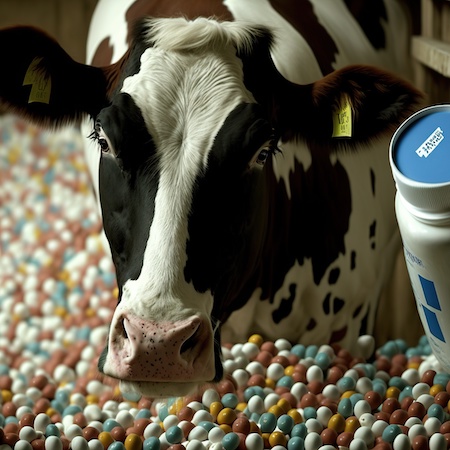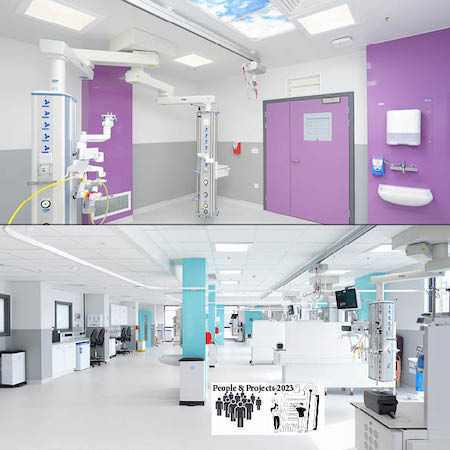The Alliance to Save our Antibiotics has called for tougher public sector food standards to control antibiotic overuse in the supply chain. The Alliance describes the Government Buying Standards for Food and Catering (GBSF) as “inadequate,” and the efforts of the ten leading catering companies supplying the public sector to control antibiotic use in the production of meat, dairy, fish and eggs in their supply chains as “weak or non-existent.”
In the first of its kind report, ‘Catering companies – feeding the antibiotic crisis?’ the Alliance outlines the growing problem of resistance to common antibiotics, caused in part by overuse of antibiotics in both animals and humans. The UK Biological Security Strategy, published in June 2023, reports that 7,600 people die annually in the UK from drug-resistant infections, at an estimated cost to the NHS of £95m per year. These statistics are all drawn from data published or collated pre-pandemic, and the problem is not going away.
Antimicrobial resistance (AMR) has been recognised by the World Health Organization as one of the top 10 ten global public health threats facing humanity, associated with the deaths of 4.95 million people in 2019. Global efforts to tackle AMR are intensifying, and in June 2023 WHO published its policy briefing document ‘Global research agenda for antimicrobial resistance in human health,’ which prioritises research topics for evidence generation to inform policy by 2030.
Intensive Care Consultant and Founder of the UK Sepsis Trust, Dr Ron Daniels puts the severity of the AMR problem into a health context. “Sepsis already claims more lives worldwide than cancer. If we can’t treat simple infections because of antibiotic resistance then tens of millions more people will die each year, meaning that antibiotic resistance is a more immediate threat to our species than climate change.”
The Alliance to Save our Antibiotics wants caterers supplying the public sector to publish antibiotic policies and adopt transparent procurement strategies. It also wants robust government standards of public procurement to ensure higher antibiotic standards for food supplied to hospitals and schools. The report recognises that the GBSF are under review, but points out that there is no mention of any need for responsible antibiotic use in the existing, or the proposed new standards.
Of the ten food companies surveyed, five are reported to have no publicly available antibiotic policy, whilst the other five do have a policy but do not currently prohibit the routine use of antibiotics. None of them collect data on the use of antibiotics in their supply chain. In this, the catering sector lags behind retail - the Alliance reports that the UK’s ten leading supermarkets have been helped by initiatives such as Business Benchmark on Farm Animal Welfare, encouraging them to adopt antibiotic policies which ban routine preventative use in their own-brand UK produce. British farm antibiotic use has been reduced by 55% since 2014 (according to the Veterinary Antimicrobial Resistance and Sales Surveillance 2021).
Matthew White, Chair of the Public Sector Catering Alliance, says: “While we welcome this report and will collectively investigate its findings, I would add that just because some caterers don’t currently have a statement about antibiotics entering the human food chain, it doesn’t mean they aren’t undertaking action to address the issue.
“As public sector caterers we already have great relationships with our suppliers, the National Farmers Union (NFU), Love British Food and with the Soil Association’s Food for Life Served Here programme that underpins the commitment of many caterers to sustainable, ethical, safe and nutritious food for all.
“Ultimately this comes down to funding – and this is an opportunity for our governments to invest in public food to ensure it is safe and prevents any future harm to our customers or indeed the planet.”
A spokesperson for Compass Group UK & Ireland, tells HEFMA: "Our current standards around the use of antibiotics in the supply chain exceed UK legislation and guidance. Compass is committed to reducing the unnecessary use of antibiotics in the supply chain and demands the highest standards of animal welfare from all our suppliers.
"Our Animal Welfare Policy requires that the routine prophylactic use of antibiotics must be avoided. Our ambition is to ban the routine use of antiobiotics and we will work with our suppliers of fresh meat, dairy, fish and eggs to achieve this."
World AMR Awareness Week is celebrated from November 18 – 24 every year. This is a global campaign to raise awareness and understanding of AMR and the threats it poses, as well as encourage behaviour to reduce the further emergence and spread of AMR.











